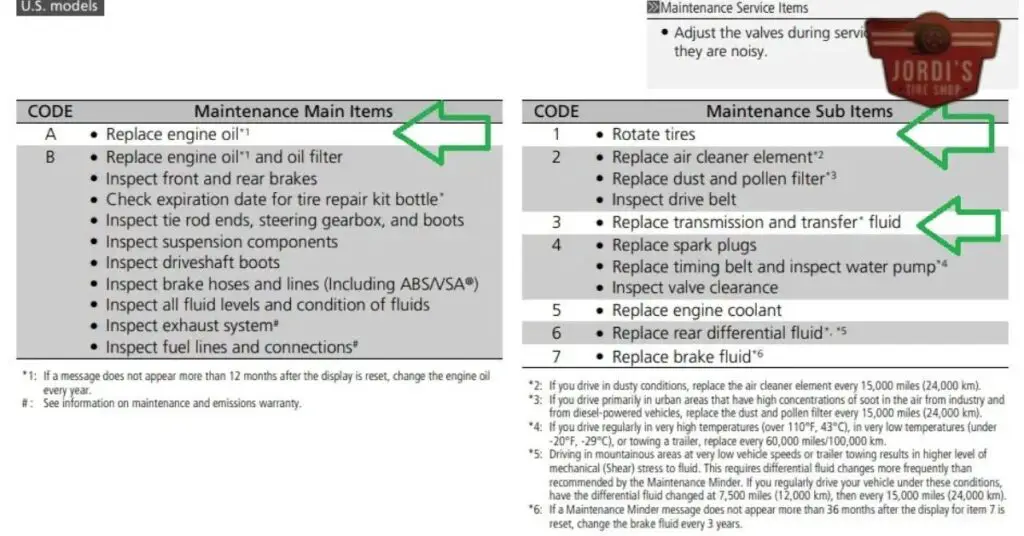Ever had that moment when your Acura flashes an A13 service code, and you’re left scratching your head, unsure of what it means? You’re not alone. This mysterious code is a common sight for Acura owners, but understanding it doesn’t have to be a challenging job.
Understanding the Acura A13 Service Code
To unravel the mystery of the Acura A13 service code, it’s crucial to grasp the context of vehicle service codes. Later, a closer look at the specifics of the Acura A13 code is required.
Defining Vehicle Service Codes
Car manufacturers, like Acura, carry out a series of service codes. These sequences indicate necessary vehicle maintenance or potential problems. Acting somewhat like an early alert system, the codes cover various areas of the vehicle. For example, the A1 code in Acura vehicles refers to an oil change and tire rotation, while the B2 code suggests filter changes and brake checks.
A Brief Overview of Acura A13
The A13 service code is unique to Acura vehicles. When appearing on your dashboard, this code indicates three exact maintenance requirements:
- Oil change (A): The ‘A’ specifies that an oil change is needed to keep the engine running smoothly.
- Tire Rotation (1): The ‘1’ refers to a necessary tire rotation to ensure even tire wear and prolong tire lifespan.
- Transmission fluid replacement (3): The ‘3’ suggests a transmission fluid change to maintain gear shifting performance.
Understanding your car’s service codes, especially the A13 code, provides a guiding light in your vehicle maintenance journey. With the knowledge of what each character signifies, you’re better equipped to take preemptive action and maintain your vehicle’s optimal performance.
An In-depth Look at the Acura A13 Service Code
Exploring deeper into the Acura A13 service code, it’s time for an intimate understanding of each of its components: the ‘A’ for an oil and filter change, the ‘1’ for tire rotation, and the ‘3’ relating to a transmission fluid replacement.
The A: Oil and Filter Change
Remember, ‘A’ in the A13 service code signposts a necessary oil and filter change. Emphasize routine oil changes for any automobile is of great significance. These changes ensure that your vehicle’s engine operates at its peak, wards off excess wear-and-tear, and keeps the mileage in check.
The 1: Tire Rotation
Carrying on with the A13 service navigation, ‘1’, assumes tire rotation. Regularly rotating your Acura’s tires balances the wear and enhances their longevity. More so, it contributes to maximum traction, ensuring your drive remains smooth and stable.
The 3: Transmission Fluid Replacement
Finally, the ‘3’ in A13 translates into a transmission fluid replacement. This essential maintenance practice anticipates the altering demands of your Acura’s transmission system. A complete replacement of the transmission fluid aids in temperature management, betters gear shifts, and provides overall optimal function for your vehicle’s performance. In short, it’s the secret to a smoother, more gratifying drive.
Essentially, comprehending what the Acura A13 service code entails is all about acknowledging the requisites of a well-maintained vehicle. Each component of this service code mirrors an essential maintenance practice that undoubtedly enhances your vehicle’s performance while elongating its lifespan. The journey to a better understanding of your Acura starts with embracing the A13 service code.
Importance of Regular Acura Service Intervals
Regular servicing intervals play a pivotal role in maintaining your Acura’s performance and longevity. Acknowledging the A13 service code components and their implications emphasizes the importance of routine maintenance.
Boosting Vehicle Performance
Regular Acura servicing, indicated by the A13 service code, enhances vehicle performance. Here’s how:
- Oil changes, denoted by ‘A’ in the service code, ensure optimal engine performance. Clean oil mitigates engine wear, thereby increasing horsepower.
- Tire rotations, represented by ‘1’, contributes to balanced wear. Following scheduled rotations guarantees smooth rides and better vehicle control.
- The criticality of transmission fluid replacement, highlighted by ‘3’, lies in ensuring smooth gear shifts. This maintenance activity defines your vehicle’s response rate and driving comfort.
Abiding by the A13 service code isn’t mere adherence to a manual; it’s an investment in your vehicle’s performance.
Prolonging Acura’s Lifespan
Another vital vantage point of heeding the A13 service interval is the impact on your vehicle’s lifespan. Here are some considerations:
- Regular oil changes (A) minimize accumulation of engine sludge. This practice maintains the longevity of the engine components, so extending your Acura’s life.
- Tire rotations (1) assuage the risk of unforeseen breakdowns caused by uneven tire wear. This simple routine can significantly prolong your vehicle’s lifespan.
- Adequate replacement of transmission fluid (3) mitigates the hazard of transmission failure. This means fewer visits to the repair shop and a longer lifespan for your Acura.
In essence, meticulously acknowledging the A13 service code ensures that your Acura’s lifespan extends beyond the norm.
Possible Problems with Ignoring the Acura A13 Service Code
Ignoring an Acura A13 service code is not a smart move. Suboptimal engine performance is one severe repercussion, typically the result of accumulated sludge due to infrequent oil and filter changes. The engine, as the heart of your vehicle, relies heavily on the steady flow of clean oil for lubrication. A compromised engine might lead to more important issues, eventually leading to hefty repair costs.
Similarly, another drawback could be a important decrease in your vehicle’s service life. Uneven tire wear, a direct result of neglecting tire rotation, can severely inhibit the vehicular lifespan. Ensuring regular tire rotation, as indicated by the ‘1’ in the A13 service code, results in balanced wear, thereby increasing the longevity of your tires and indirectly your Acura’s longevity.
Likewise, one cannot overlook the importance of the ‘3’ in the service code, which signifies transmission fluid replacement. Not attending to this crucial maintenance aspect can be a reason for your vehicle not functioning correctly. Transmission fluid ensures smooth gear shifts and, by extension, the smooth operation of your vehicle. Ignoring its replacement might lead to jerky gear shifts and potentially a complete transmission failure—a bleak circumstance indeed.
Compromised safety is another scenario that might arise from disregarding the A13 service code. Faulty engine performance or failing transmission doesn’t just mean a rough driving experience—these problems can pose serious risks while on the move. For your safety and that of others on the road, it’s recommended to take the A13 service code seriously.
So, the possibility of facing any of these problems reminds you of the importance of not ignoring the A13 service code. It’s about more than keeping your vehicle in top gear—it’s about keeping the ride safe, sound, and satisfying. Make it a priority to heed this code and ensure your Acura remains the top-notch vehicle it’s meant to be.
DIY vs Professional Acura A13 Service Code Handling
Addressing an Acura A13 service code can be a task for a state of mind, either a Do-It-Yourself (DIY) enthusiast or an industry professional. Both come with their distinctive pros and cons.
The Pros and Cons of DIY
Taking matters into your own hands and proceeding with a DIY approach isn’t without its merits, and likewise, its challenges.
Firstly, it’s cost-effective. Auto repairs and services can sum up into sizable expenses, but, if you’ve got the tools and inherent knowledge, solving the A13 code by yourself saves you a few bucks in labor charges.
Secondly, hands-on application can give you a sense of accomplishment. You’re not merely saving a few bucks; you’re also adding a new skill to your repertoire. Besides, you have absolute control over your vehicle’s well-being.
Among the challenges, lack of professional expertise tops the list. An Acura vehicle’s design, like any modern automobile, verges on the complex. Without the requisite training, background, and experience, you may end up worsening the issue.
Why You Might Need a Professional
In contrast, resorting to a professional service provider may seem the more rational choice for many. A trained mechanic’s precise diagnostic ability ensures the A13 service code gets addressed correctly and thoroughly.
Also, a professional can foresee other underlying issues that you might fail to notice. They can take care of things in a comprehensive manner, reducing the chance of more problems cropping up due to unaddressed issues.
Also, it’s a time-saver. Your normal routine won’t be disrupted, as all you’d need to do is drive your vehicle to the service center and attend to your daily tasks while the professionals do their job.
While it may seem pricier, consider the potential cost of future repairs due to improper handling or overlooked problems. The added peace of mind knowing your Acura is in the hands of skilled professionals might also justify the cost.
In the end, remember that a consistent understanding of the A13 service code is paramount. The choice between DIY and professional service comes down to an individual’s resources, skills, and confidence in ensuring the vehicle’s optimal performance and safe operation.
Acura A13 Service Code: Costs Involved
Fulfilling the A13 service code’s requirements presents two paths: enlisting professional services or executing a DIY approach. Each option bears particular costs that you must consider.
Captivating professional services in servicing your Acura significantly eliminates guesswork. The costs incurred with professional servicing span from parts’ expense to labor charges. On average, examine these cost figures:
- Oil change: $30 to $75
- Tire rotation: $25 to $50
- Transmission fluid replacement: $80 to $250
The added cost of labor fluctuates based on the current hourly rate. Typically, it ranges from $80 to $120 per hour.
In contrast, tackling the A13 service code via a DIY approach necessitates the purchase of necessary parts. The costs differ slightly compared to the professional service, primarily because labor charges are excluded. Below is an estimation:
- Oil and filter: $20 to $45
- Tires (if tire rotation leads to the discovery of worn-out tires): $50 to $250 each
- Transmission fluid: $20 to $60 per quart
Bear in mind these are generic estimations, actual costs may vary. Variables such as your vehicle’s make, model, year, and your location can influence these figures.
In sum, balance these costs against the potential adversaries of ignoring the A13 service code. Understand that it’s less about DIY classes or workshop appointment fees, it’s about securing the best possible performance from your Acura and avoiding preventable issues down the line.
Identifying Reliable Acura Service Providers
In the maze of automotive service providers, finding reliable ones for your Acura is fundamental to ensure its performance and longevity. Particular attention is given to dealing with the A13 service code, which is pivotal to the optimal function and safe driving experience in an Acura.
Key Factors to Consider
When selecting a service provider, certain factors become important for your consideration. First, consider the provider’s experience and expertise, specifically with Acura vehicles. If they’re adept at handling the A13 service code requirements—that is, oil change, tire rotation, and transmission fluid replacement—you’re on the right path.
Second, remember the importance of certified mechanics. Acura-certified technicians have specialized training in understanding complex Acura systems, offering an added layer of assurance for your vehicle’s care.
Third, investigate the quality, authenticity and durability of the parts the provider uses. Original Equipment Manufacturer (OEM) parts, for instance, are often more reliable as they match with the specifications of Acura vehicles.
Finally, you can’t overlook the provider’s reputation and customer reviews. Positive experiences from other Acura owners can shed light on the reliability of a service provider.
Typical Characteristics of Reliable Service Providers
Reliable service providers have traits that set them aside from their competition. Precision characterizes these providers—they work meticulously to ensure that each service rendered, especially those involving the A13 service code, is done correctly.
Communication is another critical aspect. These providers keep you informed about all procedures and related costs, and they’re ready to explain all details related to the A13 service code—and why it’s vital to comply with it.
Next, the best providers maintain transparency in their pricing. They’ll offer a clear and competitive quote for services including oil change, tire rotations, and transmission fluid replacement. Remember, affordable doesn’t always equal quality service, so you’d be wise to balance cost against the provider’s other traits.
Finally, reliable providers hold a high commitment to customer satisfaction. They understand that it’s not merely about servicing a vehicle—it’s about establishing trust, by continually meeting, or even exceeding, your expectations as an Acura owner.
Conclusion
You’ve now got the lowdown on the Acura A13 service code. It’s not just a random set of numbers and letters; it’s a clear call for exact maintenance tasks: an oil change, tire rotation, and transmission fluid replacement. Remember, sticking to this service schedule not only enhances your vehicle’s performance but also extends its lifespan.
Sure, you might be tempted to tackle these tasks yourself and save some money. But don’t forget the potential pitfalls of DIY maintenance. Professionals bring the expertise and diagnostics tools to handle complex vehicle systems, often saving you time and potential headaches.
Costs, whether for DIY or professional servicing, are part of owning a vehicle. But it’s important to weigh these against the potential risks of letting the A13 service code slide.
Finally, choosing a reliable service provider is key. Look for those with Acura experience, certified mechanics, quality parts, and a solid reputation. After all, your Acura deserves the best care, especially when it’s time for that A13 service.
What is the meaning of the A13 service code in Acura vehicles?
The A13 service code in Acura vehicles signals three maintenance tasks: an oil change (A), a tire rotation (1), and a transmission fluid replacement (3).
Why is the A13 service code important?
Following the A13 service code maintains optimal vehicle performance and increases the lifespan of the vehicle by minimizing engine sludge, preventing uneven tire wear, and reducing the risk of transmission failure.
What are the potential consequences of ignoring the A13 service code?
Ignoring the A13 service code can result in suboptimal engine performance, a reduced vehicle lifespan, and compromised safety due to uneven tire wear or transmission failure.
What are the options for addressing the A13 service code?
You can either do it yourself (DIY) or seek professional service for tasks like oil changes, tire rotation, and transmission fluid replacement. Both approaches have their pros and cons.
What are the estimated costs of addressing the A13 service code?
Costs range from $30 to $75 for professional oil changes, $25 to $50 for tire rotation, and $80 to $250 for transmission fluid replacement. For DIY, costs range from $20 to $45 for oil and filter, $50 to $250 for tires if worn out, and $20 to $60 per quart for transmission fluid.
How to select a reliable service provider for Acura vehicles?
Key factors to consider when selecting a service provider include their experience with Acura vehicles, the use of quality parts, the provider’s reputation based on customer reviews, and their commitment to customer satisfaction.
Related Posts:
- Deciphering the Honda B137 Service Code: A Guide for Every Honda Owner
- Decoding Honda B123 Service Code: Your Ultimate Guide to Better Vehicle Performance
- Unlocking the Mystery: Your Complete Guide to Honda’s B124 Service Code
- Deciphering Honda’s A13 Service Code: Maintenance Tips for Honda Owners
- Unraveling the Mystery: Your Complete Guide to Acura A13 Service Code
- Decoding the P1D73 Dodge Dart Issue: Comprehensive Guide to Navigate and Fix
- Mastering the C0561 71 Code: Essential Guide for a Smooth, Safe Drive
- Unlocking the Mystery: Understanding & Fixing the ECU 128 Code on Your Freightliner
- Decoding Your Car Dashboard: Unraveling the Fuel System 1 OL Fault Mystery
- Understanding STFT B1 Normal Range: Key to Optimal Vehicle Performance
- Understanding the ‘Service ESC’ Warning on Your Chevy Malibu: Safety, Diagnosis, and Maintenance












